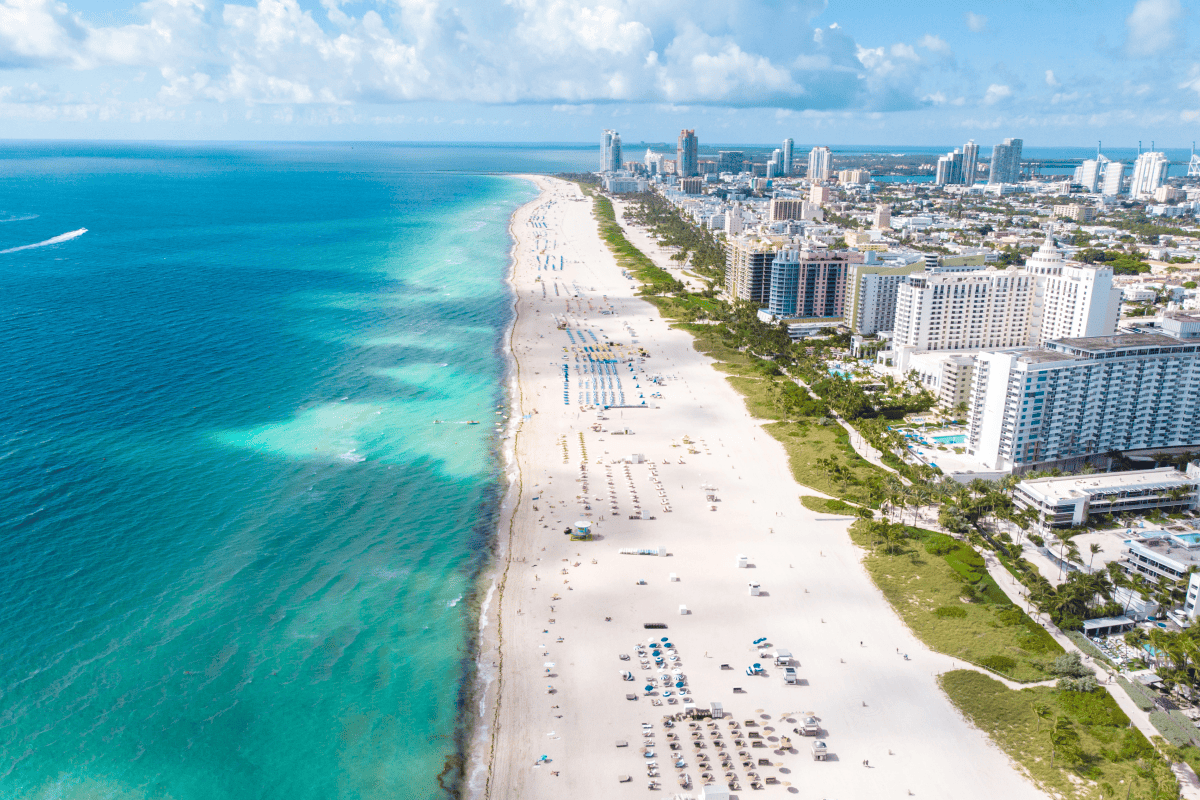Alcohol Rehab and Drug Rehab in Florida: Where Are They Located?
Florida rehabs for alcohol abuse and drug addiction are scattered throughout the state, with around 680 centers in the state.¹ Many of these facilities can be found in or around metropolitan areas such as Miami, Jacksonville, Tampa, Orlando, and Tallahassee, offering easy accessibility for local residents and out-of-state patients.
Treatment facilities can also be found in other parts of the state, from the coasts of the Panhandle to South Florida, ensuring that individuals seeking recovery can find a location that suits their needs and preferences.
Do Florida Rehabs Treat Drug and Alcohol Addiction?
Yes, individuals can find treatment for both drug addiction and alcohol use disorder at a Florida rehab center. Treatment involves evidence-based therapies and services that address the physical, psychological, and social aspects of addiction. Treatment often incorporates a combination of individual and group therapy sessions, family therapy, educational workshops, holistic practices such as yoga or meditation, and support groups like 12-step meetings.²

Substances frequently treated at Florida addiction centers:
- Alcohol
- Opioids
- Cocaine
- Methamphetamine
- Marijuana
- Prescription drugs
How Much Does Florida Drug Rehab Cost?
The cost of rehab in FL can vary significantly from one facility to another. While some programs offer their services for free, others charge substantial amounts per day. No matter your financial situation, there is a rehab facility that can accommodate your budget.
One of the primary determinants of cost is the type of treatment program. Residential or inpatient programs, which provide round-the-clock care for drug and alcohol addiction, typically have higher costs compared to outpatient programs.
The cost of these programs is also influenced by the length of the treatment program and where the facility is located. A rehab located in a state with a higher cost of living can be more expensive. The range of amenities a rehab center offers can also significantly influence its cost. Luxury rehabs, for example, can be particularly costly due to high-end amenities like gourmet dining, private rooms, swimming pools, and various wellness services.
The cost of treatment at a rehab facility can also vary depending on whether the treatment is standard or specialized. More specialized therapeutic interventions, such as dual-diagnosis treatment or trauma-informed care, may lead to higher expenses.

Does Health Insurance Cover Drug and Alcohol Treatment Programs?
Health insurance can significantly reduce the cost of rehab. Most health insurance plans in the United States, including those from private insurers and government programs, cover treatment for drug addiction and alcohol abuse to some extent. The specific coverage details depend on the individual’s insurance policy, the addiction treatment center, and the type of treatment required.
Many Florida rehab facilities accept insurance and are in-network with various insurance providers, making treatment more accessible and affordable.¹ It is advisable for individuals seeking treatment to contact their insurance provider to confirm their coverage details and reach out to the treatment center directly to confirm acceptance of their policy.
At Woburn Addiction Treatment Center, we accept most private insurance providers. Reach out to the admissions team at our Joint Commission Accredited Rehab for a free insurance check.
Payment Options for Those Without Insurance
There are a variety of resources and options available for individuals who are uninsured. Many Florida rehabs offer sliding scale fees based on income or payment plan options. Some state-funded facilities provide drug or alcohol dependency treatment at low or no cost to those who qualify, and there are nonprofit and charity organizations that often provide grants or scholarships for treatment at a rehab center.
What to Expect at a Drug or Alcohol Rehab Center in Florida?
Entering a drug or alcohol rehab center can be intimidating, especially for those who are unsure of what to expect. Treatment facilities in Florida typically follow a similar structure but may vary slightly based on the specific center and type of treatment.

Assessment and Intake
Upon arrival, you’ll typically undergo a thorough assessment. This helps the staff understand your specific situation, including your history of substance use, mental health status, and any other relevant medical information. This assessment forms the basis of your personalized treatment plan.
Medically Supervised Detox
If physical dependence on a substance is present, the first step is often detox. This process is medically supervised to ensure safety and manage withdrawal symptoms, which can range from mild to severe.
Therapeutic Services
Core components of rehab include individual, group, and family therapy and possibly dual diagnosis treatment. These sessions aim to address the root causes of addiction, teach coping strategies, and help build a supportive network.
Aftercare Treatment
Towards the end of your program, staff will work with you to develop an aftercare plan. This may include ongoing therapy, support groups like Alcoholics Anonymous (AA) or Narcotics Anonymous (NA), and strategies for relapse prevention.
Get the Care You Need at a Drug Rehab in Florida
Woburn Addiction Treatment is a leader in the addiction treatment field, with proven success in facilitating long-term recovery. Our team of top clinical & medical experts specializes in treating addiction coupled with mental illness, ensuring that each person receives individualized care. Call us – we’re available 24/day, 7 days/week.
Inpatient vs Outpatient Rehab: Which is Best for You?
Choosing between inpatient and outpatient rehab for substance use disorders is a significant decision for individuals seeking help for drug or alcohol addiction. The best choice depends on an individual’s specific needs, the severity of the addiction, available support systems, and personal circumstances.
Inpatient Treatment
Inpatient or residential treatment programs provide 24/7 care and support in a structured, safe environment. This type of treatment is typically recommended for those with severe addiction, co-occurring mental health disorders, or inadequate support at home. Inpatient treatment allows individuals to focus solely on their recovery without any distractions.²
Outpatient Treatment
Outpatient care involves attending therapy sessions and workshops at a rehab center or wellness center for a specified number of hours per week while still living at home. This option may be suitable for those with milder addictions, strong support systems, or responsibilities such as work or family that cannot be put on hold.
Outpatient services allow individuals to continue their daily lives while receiving the necessary support for recovery. The different types of outpatient care include partial hospitalization, intensive outpatient programs, and standard outpatient programs.²

How Can Rehab Staff Help Determine the Best Treatment Option for You?
The decision between inpatient and outpatient programs should not be made in isolation. The professional staff at a Florida treatment center plays a pivotal role in helping individuals identify the most suitable treatment options based on their unique circumstances and needs.
- Severity of Addiction: Individuals with severe or long-term addictions may benefit more from the intensive care and supervision provided in inpatient treatment.
- Co-occurring Disorders: Those dealing with both addiction and mental health issues, such as depression or anxiety disorders, often find the comprehensive care in inpatient treatment beneficial.
- Support System: A strong, supportive home life can contribute to the success of outpatient care. In contrast, an inpatient program may be more beneficial when an individual has a toxic or non-supportive home environment.
- Previous Treatment Experiences: If an individual has attempted outpatient services without success, they might consider trying an inpatient program.
- Responsibilities: Everyday responsibilities such as work, school, or family duties may make outpatient programs a more feasible option.

Getting Help for Substance Abuse in Florida: Resources and Options
For individuals struggling with drug or alcohol addiction, seeking help can feel overwhelming, but there are numerous resources and options available in Florida, including:
Florida Core Network
The Florida Department of Health, the Department of Children and Families, and the Agency for Health Care Administration have partnered to implement a Florida addiction care network called the Florida Core Network. Individuals can request help for alcohol and drug use issues on their site, as well as find invaluable resources for addiction recovery and mental health.
Alcoholics Anonymous and Narcotics Anonymous Meetings
Alcoholics Anonymous (AA) and Narcotics Anonymous (NA) are 12-step support groups for individuals recovering from alcohol or drug addiction. These meetings provide a supportive, understanding community, guidance, and accountability for maintaining sobriety. Meetings can be found throughout the state.
Substance Abuse and Mental Health Association (SAMHSA)
SAMHSA’s National Helpline, available at 1-800-662-HELP (4357), is a valuable resource for assistance. This helpline offers information and referral services for drug or alcohol addiction and mental health disorders. Additionally, SAMHSA’s online treatment locator tool can help individuals find addiction treatment centers in their area.
Sources
- Substance Abuse and Mental Health Services Administration. (2022). National Survey of Substance Abuse Treatment Services.
- National Institute on Drug Abuse. (2018). Principles of drug addiction treatment: a research-based guide (third edition).


